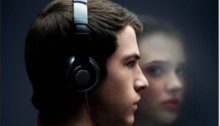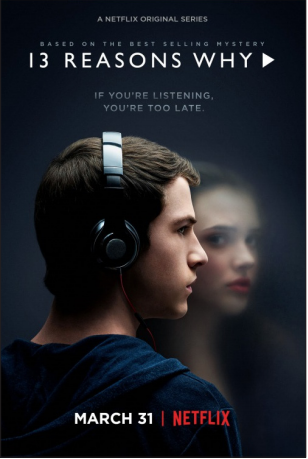Season One of the Netflix series 13 Reasons Why was controversial. The series is about a teenage girl, Hannah, who commits suicide in the series’ finale. Before doing so, she records 13 reasons why she did it and includes a list of rules to accompany the tapes
Friend and fellow high-school classmate, Clay, receives a mysterious box filled with audio cassette tapes anonymously left at his door. When he plays the first tape, he realizes they were recorded by his recently deceased friend and romantic interest, Hannah.
The tapes come with a map of the town allowing listeners to visit the places described in the tapes. The rules included with the tapes state the receiver of the box must listen to the tapes to discover what role they played in Hannah’s decision to commit suicide. Then they pass them on to the next person on the list, as everyone on the list played a role in her decision to end her life.
A film critic’s view
Films and television shows convey the human experience. Romantic comedies explore humanity’s quest for love, horror movies deal with society’s collective anxieties and dramas investigate interpersonal tensions. Entertainment exposes humanity — the good, bad and everything in between.
13 Reasons Why is meant to be dark and disturbing. Its effect is intensified by targeting the series to adolescents. Teens were also the target audience of the book of the same name by Jay Asher. The series, while emphasizing the emotional trauma that comes from being bullied, also shows in detail how sexual violence escalates.
Most of the television shows aimed at teenagers touch upon issues of sexual assault. Such issues range from Spike’s attack on Buffy in Season 6 of Buffy the Vampire Slayer to Trey’s violation of Marissa on The O.C. 13 Reasons Why reveals the reality of rape culture.
Rape culture is the sociological concept describing a setting in which rape is normalized due to societal attitudes toward gender and sexuality.
In her 1984 essay “The Rape Culture,” Dianne Herman demonstrates that American society is a rape culture because it fosters and encourages assault by teaching that it is natural and normal for sexual relations to involve aggressive behavior on the part of males. Her essay suggests that to end rape, people must be able to envision a relationship between the sexes that involves sharing, warmth and equality. Ideally, society needs to be based upon the reinforcement of such qualities
13 Reasons Why features two examples of rape culture in which an alpha male jock attacks two of the students, Hannah and her friend Jessica. In episode nine, we learn Hannah was hiding in a room during a summer party where she witnessed Bryce rape Jessica, with the consent of Jessica’s boyfriend, Justin. The second example occurs in the penultimate episode of the first season. Hannah ends up alone with Bryce and he assaults her.
The show reinforces the popularly held, yet incorrect belief, that, by not saying no, a person is giving consent. This exposes a necessity of understanding the definition of informed consent.
In the series, two characters are punished. Jessica becomes an alcoholic to cope with the anguish of being raped and Hannah decides that her only options are to move on (an impossibility) or to kill herself (to stop feeling anything at all). Amid the anguish the two women experience, Bryce remains the popular jock on campus. The show exposes the idea that when it comes to rape culture and informed consent, college age is too late.
The question becomes: Is this portrayal of adolescent life ethical? The answer to that question seems to be “yes” as the show exposes the reality that many teenage girls live with.
Date rape is a concern of adolescent girls, and teen suicides have increased in recent years. Censoring Hollywood narratives exploring such issues does not make them go away.
The forthcoming season two (available on Netflix on May 18) will feature a content — or trigger — warning to alert viewers that the show’s content is of a sensitive and disturbing nature.
In the case of the first season, trigger warnings were only featured on the episodes that included especially graphic content. Netflix received much criticism for this and added a blanket content warning before all the episodes of Season One in response.
Some religious critics, however, suggest a warning is not enough and that the show should be unavailable to teenagers in the first place. They argue that only happy teenage existence should be portrayed on screen. This is exemplified by the online movement pushing “13 Reasons Why Not,” an announcement of all the things teenagers have to live for — acting as a direct statement against the Netflix show.
So what’s a program to do?
This goes back to ethics. How should teenage life be portrayed on screen? Would it be more appropriate to only produce entertainment that depicts a happy teenage existence? Who would that serve?
Such happy-only treatment would be a fallacy. The truth is that life is difficult and bad things happen.
Certainly, Netflix shows should come with trigger warnings. Themes of rape and suicide are difficult even for adults, let alone adolescents. However, adding a warning offers a middle-ground way of dealing with the ethics of showing content of this nature. It is important to understand that real life cannot be censored and thus portraying these kinds of narratives is important. It is equally important to offer trigger warnings on sensitive content as to not add undue emotional stress to an unsuspecting spectator.


I don’t think the title of your article matches the content lol. Just kidding, mainly because I had some doubts after reading the article. 100 USDT
I don’t think the title of your article matches the content lol. Just kidding, mainly because I had some doubts after reading the article.
Thank you for your sharing. I am worried that I lack creative ideas. It is your article that makes me full of hope. Thank you. But, I have a question, can you help me?
Can you be more specific about the content of your article? After reading it, I still have some doubts. Hope you can help me.